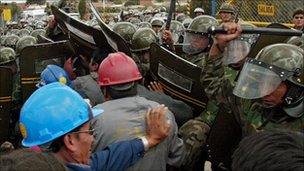Glencore float puts spotlight on publicity-shy firm
- Published

Workers at a Glencore mine in Bolivia clash with troops in 2007 over plans to nationalise the operation
Glencore has never been far from controversy. It has earned the epithet "secretive", yet its size and activities ensure it is rarely out of the news.
The Swiss-based giant is the world's biggest supplier and trader of commodities.
And in an era when the price of raw materials is soaring, driven by resource-hungry economies stretching from China to Brazil to America, that makes Glencore a powerful player in a critical industry.
Founded in 1974 by billionaire Marc Rich, the company - then called Marc Rich & Co - was subsequently accused by the US authorities of tax evasion and illegal business activities with Iran.
Mr Rich was pardoned by US President Bill Clinton in 2001, and never stood trial on the charges. The episode was a conspiracy-theorist's dream.
When the company teetered on the edge of bankruptcy it was taken over by Marc Rich's close business associates and renamed Glencore.
It has been said that God's joke was to put the world's valuable resources in unholy places, and Glencore's dealings over the years in geo-political hot-spots like Congo, Zambia, Iraq, and South America has drawn the company into a series of controversies. Glencore has denied any wrongdoing.
And yet the executives running what is now one of Europe's top ten biggest companies by turnover say virtually nothing publicly.
This may be about the change. The flotation - London's largest ever and turning executives into billionaires - will propel Glencore into the FTSE 100 and impose upon the company stringent disclosure rules.
Already, though, there have been reports of tensions about Glencore's emergence from the shadows.
It was disclosed last month that former BP boss Lord Browne withdrew from a decision to become Glencore's chairman, a move attributed to his concerns over transparency.
The man who is to take over as chairman, Simon Murray, then became embroiled in a spat after saying that women rarely got to the top of business because of their desire to have children.
For a publicity-shy company, Glencore knows how to make headlines.